Advertisements
Advertisements
Question
Angles of a quadrilateral are (4x)°, 5(x+2)°, (7x – 20)° and 6(x+3)°. Find :
(i) the value of x.
(ii) each angle of the quadrilateral.
Solution
Angles of quadrilateral are,
(4x)°, 5(x+2)°, (7x – 20)° and 6(x+3)°
∴ 4x + 5(x + 2) + (7x - 20) + 6(x + 3) = 360°
4x + 5x + 10 + 7x - 20 + 6x + 18 = 360°
22x + 8 = 360°
22x = 360° - 8°
22x = 352°
x = 16°
Hence angles are,
(4x)° = (4 × 16)° = 64°
5(x + 2)° = 5(16 + 2)° = 90°
(7x - 20)° = (7 × 16 - 20)° = 92°
6(x + 3)° = 6(16 + 3) = 114°
RELATED QUESTIONS
How many diagonals does following have?
A triangle
ABCD is a parallelogram, AD is produced to E so that DE = DC and EC produced meets AB produced in F. Prove that BF = BC.
In a quadrilateral, define of the following Angles .
In a quadrilateral, define of the following Adjacent angles .
In a quadrilateral, define of the following Exterior .
Complete of the following, so as to make a true statement:
In a quadrilateral the point of intersection of the diagonals lies in .... of the quadrilateral.
In Fig. 16.19, ABCD is a quadrilateral.
How many pairs of adjacent angles are there?
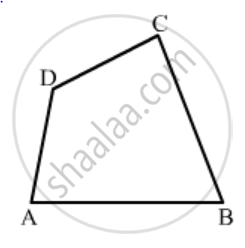
The three angles of a quadrilateral are respectively equal to 110°, 50° and 40°. Find its fourth angle.
Two angles of a quadrilateral are of measure 65° and the other two angles are equal. What is the measure of each of these two angles?
The sides of a quadrilateral are produced in order. What is the sum of the four exterior angles?
In a quadrilateral ABCD, CO and DO are the bisectors of ∠C and ∠D respectively. Prove that \[∠COD = \frac{1}{2}(∠A + ∠B) .\]
Complete the following statement by means of one of those given in brackets against each:
If in a quadrilateral only one pair of opposite sides are parallel, the quadrilateral is ................
Mark the correct alternative in each of the following:
The opposite sides of a quadrilateral have
Use the information given in the following figure to find :
(i) x
(ii) ∠B and ∠C
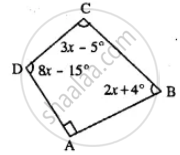
Given : In quadrilateral ABCD ; ∠C = 64°, ∠D = ∠C – 8° ; ∠A = 5(a+2)° and ∠B = 2(2a+7)°.
Calculate ∠A.
In the given figure : ∠b = 2a + 15 and ∠c = 3a + 5; find the values of b and c.
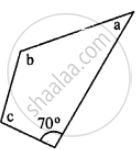
In quadrilateral PQRS, ∠P : ∠Q : ∠R : ∠S = 3 : 4 : 6 : 7.
Calculate each angle of the quadrilateral and then prove that PQ and SR are parallel to each other
(i) Is PS also parallel to QR?
(ii) Assign a special name to quadrilateral PQRS.
In a quadrilateral ABCD, AO and BO are bisectors of angle A and angle B respectively. Show that:
∠AOB = (∠C + ∠D)
In a trapezium ABCD, side AB is parallel to side DC. If ∠A = 78° and ∠C = 120. find angles B and D.
Angle A of an isosceles trapezium ABCD is 115°; find the angles B, C and D.
In parallelogram ABCD, ∠A = 90°
(i) What is the measure of angle B.
(ii) Write the special name of the parallelogram.
The three angles of a quadrilateral are 71°, 110°, 95°. Find its fourth angle.
Find the angles of a quadrilateral whose angles are in the ratio 1: 4: 5: 2.
One angle of a hexagon is 140° and the remaining angles are in the ratio 4 : 3 : 4 : 5 : 4. Calculate the measures of the smallest and the largest angles.
If angles A, B, C and D of the quadrilateral ABCD, taken in order, are in the ratio 3 : 7 : 6 : 4, then ABCD is a ______.
A quadrilateral can have all four angles as obtuse.
In the given figure.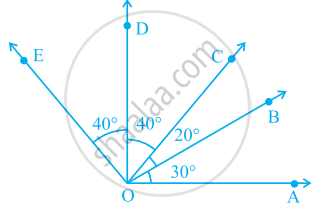
∠AOE is a/an ______ angle
What conclusion can be drawn from part of given figure, if DC is the bisector of ∠ADB, CA ⊥ DA and CB ⊥ DB?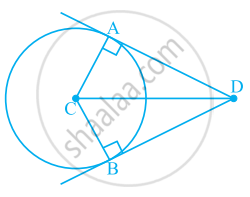
An angle is said to be trisected, if it is divided into three equal parts. If in the given figure, ∠BAC = ∠CAD = ∠DAE, how many trisectors are there for ∠BAE?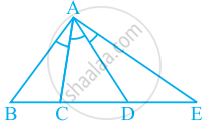
Draw a rough sketch of a quadrilateral KLMN. State two pairs of adjacent angles.
